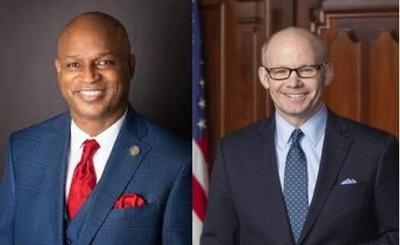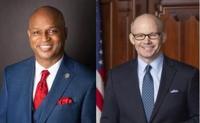
Illinois House Speaker Emanuel “Chris” Welch and State Senate President Don Harmon
Over the objections of business advocates, Illinois Democratic lawmakers have passed a potential new law which would greatly expand the ability of trial lawyers to use Illinois' notoriously plaintiff-friendly state courts to extract potentially massive paydays from companies throughout the U.S.
An analysis of campaign donation activity shows many of those same trial lawyers who could stand to gain the most from the change in the law were among the most prodigious of all donors to the campaign funds of Springfield's two most powerful Democratic legislators, accounting for more than one-third of all contributions to the primary campaign funds of Illinois House Speaker Emanuel "Chris" Welch and state Senate President Don Harmon in the final six months of 2024.
Known as SB328, the legislation essentially rewrites the rules of personal jurisdiction for Illinois' legal court system.
To this point, Illinois' courts have operated as so-called "specific jurisdiction" legal venues. Under that system, plaintiffs attempting to sue a corporation in Illinois state courts needed to demonstrate either that particular defendant had sufficient ties to the state or that the incident that caused the alleged harms occurred in Illinois or had a strong enough connection to Illinois.
These specific jurisdiction rules, which have historically controlled in most U.S. states - while not fool proof - have served to limit the legal exposure of companies which operate across state lines, blocking trial lawyers from essentially "forum shopping" by choosing to file lawsuits in courts in states considered to be more friendly to plaintiffs' pursuit of massive verdicts and settlements, often worth millions or even billions of dollars, or by even hammering companies with lawsuits over similar claims in multiple courts across the country.
Businesses and lawsuit reform advocates have denounced such tactics as abuses of the nation's legal system in pursuit of big profits for trial lawyers.
However, under the SB328 legislation, the law would be rewritten to subject any company that is registered to do business in Illinois to lawsuits in the state, specifically for "injury and illness resulting from exposure to a substance defined as toxic" under Illinois state law "whether the cause of action arises within or without the State."
The legislation sprang up suddenly on May 29, as Democrats moved to ram through the legislation using a controversial legislative tactic designed to essentially bypass a strict adherence to Illinois state constitutional provisions otherwise forbidding the rapid passage of quickly introduced legislation.
Under the new legislation, Illinois trial lawyers are seeking to take advantage of a recent U.S. Supreme Court ruling. In the 2023 decision in Mallory v Norfolk Southern Railway, the high court ruled 5-4 that a similar general jurisdiction law in Pennsylvania didn't necessarily violate defendants' right to due process. That ruling brushed aside concerns that Pennsylvania's law had made courts in Philadelphia, in particular, a popular destination for so-called "litigation tourism," or out-of-state legal claims against companies not based in Pennsylvania.
Business advocacy and lawsuit reform organizations are intending to petition the U.S. Supreme Court to use new cases now on appeal to overturn or blunt the impact of the Mallory decision.
But under SB328, Illinois could follow in Pennsylvania's footsteps, becoming perhaps the 12th state to enact a similar law.
The legislation notably drew support from labor unions and the Illinois Trial Lawyers Association, among others.
The bill drew strong opposition from a coalition of nearly two dozen Illinois business advocacy groups.
Illinois Democratic Gov. JB Pritzker has not yet signed the legislation, nor indicated how he will handle the potential new law.
Business groups and lawsuit reform advocates are hoping Pritzker will follow the example set by his Democratic counterpart in New York. In that state, Gov. Kathy Hochul vetoed similar legislation in 2023, saying she feared the harm that could come to New York's economy should the Empire State loosen jurisdictional rules to allow trial lawyers to wield that state's courts against business as Illinois trial lawyers hope to do in the Prairie State.
However, while Pritzker, a billionaire, has largely self-funded his own two successful gubernatorial campaigns, Illinois Democratic state legislators - and in particular, Speaker Welch and Senate President Harmon - have benefitted heavily from the largesse of Illinois' trial lawyers.
According to a report published this March by Illinois Citizens Against Lawsuit Abuse, Illinois trial lawyers have proven to be a significant source of campaign money for Illinois Democrats, exclusively.
According to the report, titled "Follow the Money," the Illinois Trial Lawyers Association's political action committee (PAC) from 2022-2025 donated more than $1 million "exclusively into Democratic political campaigns and organizations."
"Not a single dollar went to Republican candidates or committees, making it clear that ITLA PAC's financial influence is a partisan operation designed to buy loyalty from the party in power," the CALA report said.
In Illinois' case, that is exclusively Democrats, who hold supermajorities in both houses of the state's General Assembly, as well as the governor's mansion and all statewide elected offices.
The CALA report indicated that 81% of ITLA's political donations were steered to help Democrats win state legislative seats, "ensuring that the very lawmakers responsible for shaping civil justice laws remained financially beholden to the trial lawyers' agenda," CALA said.
In addition to donations directly to candidates, ITLA donated to organizations designed to help Democrats win or retain seats in the Illinois state House or Senate, including the committees known as Democrats for the Illinois House and the Illinois Senate Democratic Fund.
An additional 3% of ITLA donations went directly to the Illinois Democratic Party, while other donations went to committees to help Democrats win county government offices.
However, no political figures were showered with more trial lawyer money than Welch and Harmon.
Under Illinois legislative rules and the state constitution, Welch and Harmon hold massive amounts of power in Springfield and beyond, in no small part due to their outsized ability to decide the fate of legislation and steer campaign funds to aid or harm chosen candidates throughout Illinois.
Former Illinois House Speaker Michael J. Madigan, for instance, is awaiting sentencing from a federal judge, after he was convicted for using the power of his office to win favors for friends and allies in exchange for pushing through legislation favorable to electrical utility company, ComEd.
Madigan was also a darling of Illinois trial lawyers, raking in millions of dollars in campaign donations from personal injury attorneys and others through the years. In one of his final acts in office, Madigan notably rammed through legislation sought by trial lawyers to impose steep “prejudgment interest” on nearly all jury verdicts secured by plaintiffs to jack up the payouts from businesses who lost in Illinois state court.
Now, Welch and Harmon appear to also be similarly favored by Illinois trial lawyers, who continue to seek to change the laws to make it easier to sue businesses in the state’s courts.
According to the CALA report, Welch received $80,000 directly from ITLA PAC from 2022-2025, while Harmon took in $75,000.
The only other Illinois state lawmaker to receive at least $20,000 from ITLA was State Rep. Jay Hoffman, D-Belleville, according to the report.
Hoffman served as the chief sponsor of the new SB328 in the state House, while Harmon signed on as the legislation’s chief sponsor in the state Senate.
However, the funding from ITLA identified in the CALA report stood as only a fraction of what Welch and Harmon have actually received from trial lawyers.
According to Illinois campaign finance reports, trial lawyers and their firms donated a combined $1.78 million to the primary campaign committees for Welch and Harmon just in the final six months of 2024.
Welch's campaign fund reported at least $967,000 in campaign donations from personal injury law firms, individual attorneys and other trial lawyers who could stand to directly benefit from the jurisdictional rule changes spelled out in SB328.
During that same time frame, Welch's Senate counterpart, Harmon, reported $809,000 in campaign donations from trial lawyers.
All told, the trial lawyer donations accounted for 35% of all donations reported by Welch from July to December 2024, and 34% of Harmon's donations in that same span.
Notable donors to both Welch's and Harmon's campaign committees from July-December 2024 included:
The personal injury law firm of Corboy & Demetrio, of Chicago, which donated a combined $60,000;
Meyers & Flowers, of St. Charles, Illinois, which donated a combined $50,000;
Korein Tillery, of St. Louis, $50,000;
Cooney & Conway, of Chicago, $50,000;
Clifford Law Offices, of Chicago, $50,000;
Hurley McKenna & Mertz, of Chicago, $50,000;
Keefe Keefe & Unsell, of Edwardsville, Illinois, $50,000;
Levin & Perconti, of Chicago, $50,000;
Simmons Hanly & Conroy, of Alton, Illinois, $50,000;
Salvi Schostok & Pritchard, of Chicago, $50,000;
Romanucci & Blandin, of Chicago, $50,000;
Smith Lacien, of Chicago, $50,000;
Taxman Pollock Murray & Bekkerman, of Chicago, $50,000;
The Gori Law Firm, of Edwardsville, $50,000;
Tomasik Kotin Kasserman, of Chicago, $50,000;
Power Rogers LLP, of Chicago, $50,000;
Edelson P.C., of Chicago, $45,000;
Disparti Law Group, of Chicago, $45,000;
Coplan & Crane, of Oak Park, Illinois, $45,000;
Rich Rich Cooksey & Chappell, of Fairview Heights, Illinois, $45,000
Ankin Law, of Chicago, $45,000; and
Morrissey Legal Group, of Chicago, $38,250.




